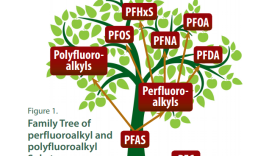A vote in New York on whether to adopt recommended maximum contaminant levels in drinking water for three chemicals has been postponed a second time because of the COVID-19 pandemic. Still, clean water advocates say they are disappointed with another delay.
The state Department of Health on Monday said a June 4 meeting of the Public Health and Health Planning Council is canceled because of the state’s focus on the pandemic and reopening. The recommended maximum contaminant levels in drinking water are 10 parts per trillion each for PFOA and PFOS, emerging contaminants found in Hoosick Falls and Newburgh, respectively; and 1 part per billion for 1,4-Dioxane. Maureen Cunningham is Environmental Advocates of New York senior director for Clean Water.
“We know that the Department of Health is working on COVID-19, and that’s clearly a public health crisis, but drinking water that’s been contaminated is also a public health crisis, of a different scale,” Cunningham says.
Brad Hutton is state Health Department Deputy Commissioner for the Office of Public Health.
“We’re really right in the throes of reopening, continuing to support really high priority efforts across the state, including our drive-through testing sites, setting up a new contact tracing initiative to make sure that reopening goes as well as it can, and so, unfortunately, we’re not in a position where we’ve completed the review of public comments for that MCL reg package,” Hutton says.
That comment period was for a proposed deferral provision, which, in general, environmentalists oppose and water suppliers support. It did not change the recommended MCLs. In addition, Hutton says COVID-19’s devastating financial impact on state and local governments is another factor.
“And to make sure that it doesn’t have a detrimental impact on the commitment that the state made to provide funding to support water systems and offset the costs for the treatments if they have a finding in excess of the MCLs,” says Hutton.
Monday’s announcement that the June 4 meeting would be cancelled came the same day that the New Jersey Department of Environmental Protection officially published its adoption of drinking water standards of 14 parts per trillion for PFOA and 13 parts per trillion for PFOS. Dan Shapley, Water Quality Program Director for Riverkeeper, says he’s sympathetic to DOH staff being overburdened and focused on the pandemic.
“While we don’t want to see a delay, we do understand why there has been a delay to this point,” says Shapley.
Shapley and other advocates were on a call today with DOH. Again, Hutton:
“And so under the governor’s, one of the governor’s executive orders here in COVID, some of those rulemaking deadlines did get a 90-day extension, which means that we need to complete our rulemaking by August 7, otherwise it will expire and we’ll need to start again,” Hutton says.
“We’re very much committed to getting this resolved and making sure that that deadline doesn’t become an issue,” says Hutton.
State Assembly Health Committee Chair Richard Gottfried and Assembly Environmental Conservation Chair Steve Englebright wrote to DOH May 28 asking that the June 4 meeting take place, even virtually, as planned. Fellow Democrat State Senator James Skoufis, whose district includes Newburgh, wrote a May 22nd letter asking the same. Environmental Advocates’ Cunningham:
“What we do know is that PFAS chemicals have health effects that include immune dysfunction and an increased risk of asthma. We know that UAlbany is looking into the health effects of PFAS on people but also they’re looking at vaccine effectiveness of people that have been impacted by PFAS chemicals,” Cunningham says. “So all of this has implications for the COVID-19 crisis and really adds a sense of urgency for getting these drinking water standards finished so that people know that they’re not drinking contaminated water.”
Riverkeeper’s Shapley:
“Setting this standard is also critically important to the cleanup in Newburgh and to other sites around the state and particularly those sites like Newburgh where the federal government is responsible for the cleanup, because what we are seeing is the federal government, the Department of Defense, keeps pointing to the federal guidelines, which are very weak and not as protective as the state standards that we want to have set as soon as possible,” Shapley says. “So once these state standards are set for drinking water, state cleanup standards follow, those become legally enforceable and we’re going to get better cleanups, and we’re going to get the cleanups that we need in Newburgh and elsewhere.”
Shapley refers to Newburgh’s PFOS water contamination that stems from Stewart Air National Guard base. The U.S. Environmental Protection Agency has an advisory level for PFOA and PFOS of 70 parts per trillion each.











